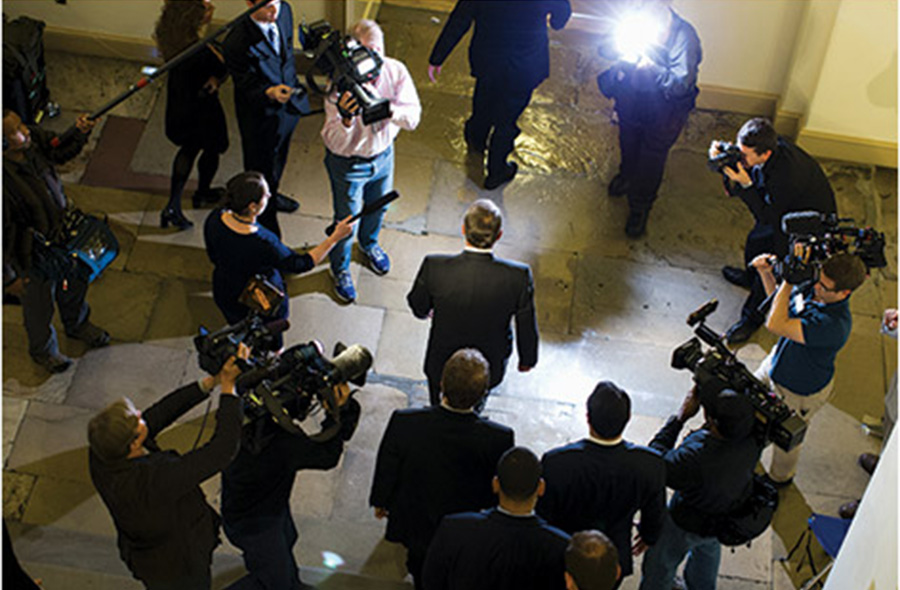
In my article in the last issue of Jetset, I wrote about leadership . . . and how the blame game affects us all and diminishes our power to affect change and impact the future.
As promised, my good friend and Rich Dad Advisor Blair Singer, an internationally-recognized expert on team building and sales training, will share more of the lessons he learned climbing Mt. Kilimanjaro.
“The blame game affects us all and diminishes our power to affect change and impact the future.”
In my last article, I wrote about my experiences in the Vietnam War and a friend and fellow helicopter pilot’s disastrous mistake. It was the result of fear and panic — and it cost lives. My reason for recounting that story was not only about that tragic casualty of war, but about the aftermath. How we deal with challenges, problems and disasters. How we take responsibility and shoulder blame, if necessary, to be the leaders that today’s leadership roles demand.
My point, in Part One of this article, is this: Today we have a nation of leaders who are incompetent, fearful and panicked. When I turn on the television and watch them speak, I simply wish they would be less lame and more forthright. No one person has all the answers and the challenges that the future presents — related to debt and entitlements. It’s time to demand that leaders step up to the challenge and to the responsibilities of leadership.
I see the U.S. economy today as a situation much like my friend’s helicopter disaster: “floating” over some serious problems and threats. To be fair, our current leaders did not create this financial mess. They inherited the financial crisis from previous leaders. The problem is, our current leaders are being lame — just like many of the leaders before them — “kicking the can down the road” yet again. The problem is that the road is coming to an end.
As I see it, we as a nation and a world are faced with three options. They are:
- Pay off the debt
- Default on our obligations
- Print more money
If we pay off the debt, the U.S. economy would collapse. If the United States defaults on its debts, the world economy collapses. If we print money to pay off our debt, we would have hyperinflation, then hyperdeflation . . . and then we collapse.
These are not very exciting or appealing options.
Personally, I (as many of you) have enough money and am old enough to collect Social Security and Medicare benefits. As we all know, the entitlement programs are in dire straits and Social Security and Medicare benefits represent money the government doesn’t have.

In my opinion, this isn’t a time for me to step backwards. It’s not a time for me to ratchet down my commitment to being an agent of change. Rather than retire — play golf, be lame and blame our leaders for our problems — I believe it’s time for me to do more.
In 2014, my company, the Rich Dad Company, will launch two global initiatives to teach financial education, a subject that should be taught in schools to anyone who wants to learn. One initiative is via the Worldwide Web, using games to teach finance, entrepreneurship and investing. The second is a grassroots approach of teaching those same subjects via clubs in cities throughout the world. You may have noticed that I apply my military school training to business strategy, utilizing both “air” and “ground” vehicles to solve a global problem.
My message to all of you is we need more leaders like you to step forward like Kevin and Kristen of K2Leadership have, like so many of you already have. In Part One of this article, Blair Singer contributed the story of his experience with K2Leadership. Here are his insights into that company’s leadership secrets.
“To be fair, our current leaders did not create this financial mess. They inherited the financial crisis from previous leaders.”
My point for choosing the subject of leadership for Jetset Magazine is because the readers of Jetset represent the upper one-tenth of one percent of the U.S. population. Life has been good to you, to us. The world needs our help. It is no longer enough to simply be lame and blame our leaders for the mess we are all in. We can all do something more.
I’ll close, again, with the words of Robert Kennedy:
“To those whom much is given, much is expected.”
In this new year, we have the opportunity to commit, anew, to taking responsibility for the future.
In the last issue of Jetset, I had the opportunity to contribute to Robert’s article on leadership . . . and responsibility. And, as promised, I’m including K2Leadership’s 10 secrets below.
As with Robert’s teachings related to personal finance and financial freedom, I think that you’ll find that strong leadership starts not with words . . . but with creating a context — an environment — that creates extraordinary results.

1. Create and identify narrow time boundaries.
Kevin and Kristen were always very clear in telling us to never ask about what was going to happen tomorrow or the next day. We were only allowed to ask about today. We were told how many hours we would be climbing and what to expect, but nothing more. Everything was compartmentalized into understandable and narrow, limited time frames. Wake-up to breakfast, hiking to lunch, hiking to camp, unpacking and rest, afternoon tea and dinner, then sleep. I always say that most people cannot plan past lunch. Long-term goals and strategies are fine, but to keep a team focused you have to shrink the space.
2. Eliminate uncertainty through preparation and frequency of contact
Lots of mental stress comes from not knowing how to prepare for the unknown. Every night at dinner we were told what the next day would look like, what to pack and how to pack it. How many times have you ever thrown your team into a task and let them “figure it out” for themselves? Months before leaving on this trip, we had team meetings, team hikes and team packing parties. We learned to be comfortable with our gear, our bodies and our tasks. It eliminated a whole chunk of potential anxiety and worry about what will happen and questioning ourselves, “Am I prepared?”
3. Tight rules
They were clear and firm: Never pass the lead guide on the trail, stay together, be on time, drink lots of water, etc. These tight rules brought the team closer together. You felt safe because, even though you were way outside your normal comfort zone, you were safe inside a bandwidth that you knew you could trust and did not have to think about. Once at the summit, our orders were clear: Take your pictures and start your descent right away. Those who were showing signs of altitude sickness headed down immediately. Even in moments of victory, close vigilance was maintained. Many times, when we celebrate, that’s when we take our eyes off the game. Lives depended on it.
4. Lots of humor
Everyone on the team got a nickname. My son was “sleeping beauty” because while most of us had trouble sleeping at higher altitudes, he would crash at 7:30 in the evening and sleep like a rock until 6:30 the next morning. It made for lots of laughs. My nickname was “peebottle” because it took me two days to finally use a pee bottle in my tent at night rather than getting dressed and having to go out of my tent to fight the cold in the middle of the freezing nights. Laughter breaks the tension, reminds you that you are human, and that nothing is so big that you cannot enjoy and laugh, at and with each other.
5. Forced focus and presence
We were continually told to focus on our feet, one step at a time. Only inches at a time. It forced your whole perception to narrow to a very small space at your feet. We were told, “rest, step and pressure breath,” over and over. That became a kind of mantra that created both a rhythm and a focus that, over five days, got us to the top.
6. Removal of distractions that would cause stress to the team
There were three porters for every one of us on the climbing team. They carried the food, tents, supplies and most of our mountain gear. They were at our tents at 6:30 every morning with coffee and tea, cooked delicious meals, cleaned up, broke camp and set it up again the next day. All we had to worry about was ourselves, getting rest, eating a lot and hiking. As a leader, you need to eliminate the distractions that cause your team to wander, lose focus and stress out. Your goal is to keep them focused on what they are setting out to achieve. It’s good to ask yourself: How well do you take care of them?

7. Being tireless students of their own trade
Kevin and Kristen continue to take classes on mountain safety, being a first responder, the local culture and the details of conditioning and training. Do you love what you do enough to be a voracious student about it? When you do, it’s reflected in both the quality of your leadership skills and your success.
8. No smoke but tons of encouragement
They rarely told us, ”you will make it.” Rather, they were always there in or alongside our team hiking column, periodically saying, “Great job, keep working, you’re doing great!” Their words always came at the right moments to feed depleted lungs and tired muscles with the right amount of energy.
9. Continually watching the team
Kevin and Kristen seemed to know exactly when the team was waning a bit. They watched us all day like hawks, coming up to us individually and asking how we were doing, how we were feeling, and — just as you thought you were fading — they would magically call a break for rest, food and water. It always seemed like it came at the perfect time. It triggered this question to myself: Are you focused only on the objective or are you continually watching and calibrating your team?
10. Incredible graciousness
Their treatment of the porters, guides, locals and the community was nothing short of magnificent. In fact, the whole reason for the expedition was to support the kids in the school and orphanage, the story I shared in the previous issue of Jetset. Serving others who serve you is the stuff of great leaders. The friendship, trust, camaraderie and caring between K2 and those who supported our expedition creates a context in which K2 is always welcomed back, always watched out for and always appreciated.
At 19,340 feet it seems to come together, but do you know what? It starts way before that. It is about creating a context that is specifically designed for the outcome that you want. Creating an environment that is safe, certain, gracious, fun and rigorous takes work. What I can tell you is that their work changes lives. And they’ve given me lessons in leadership that are inspiring and that I can share with those I teach.
Thank you, Kevin and Kristen, for giving so much by being the awesome leaders that you are. Thanks, too, to Robert for the invitation to collaborate on this article… and to Jetset for this awesome, world-class forum.

